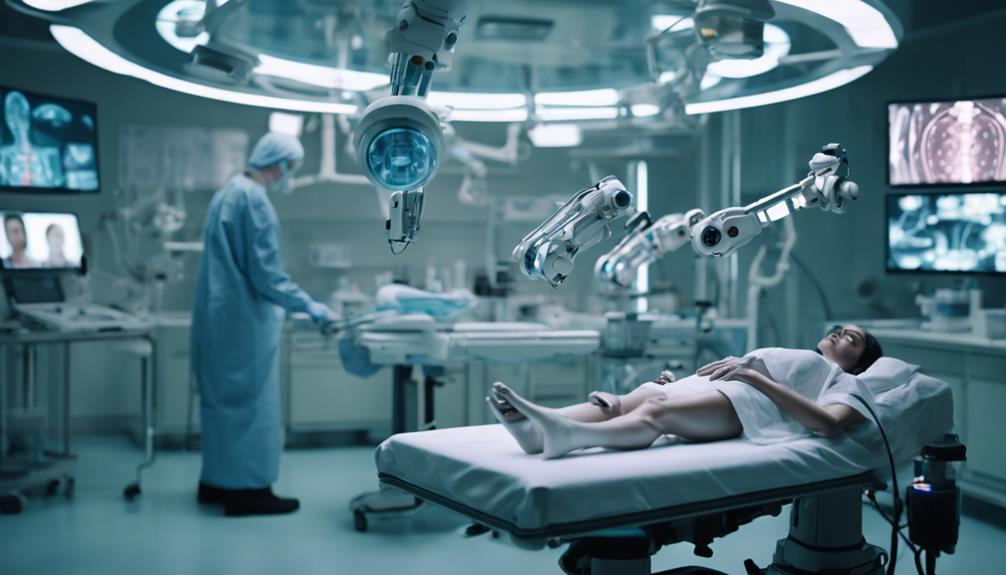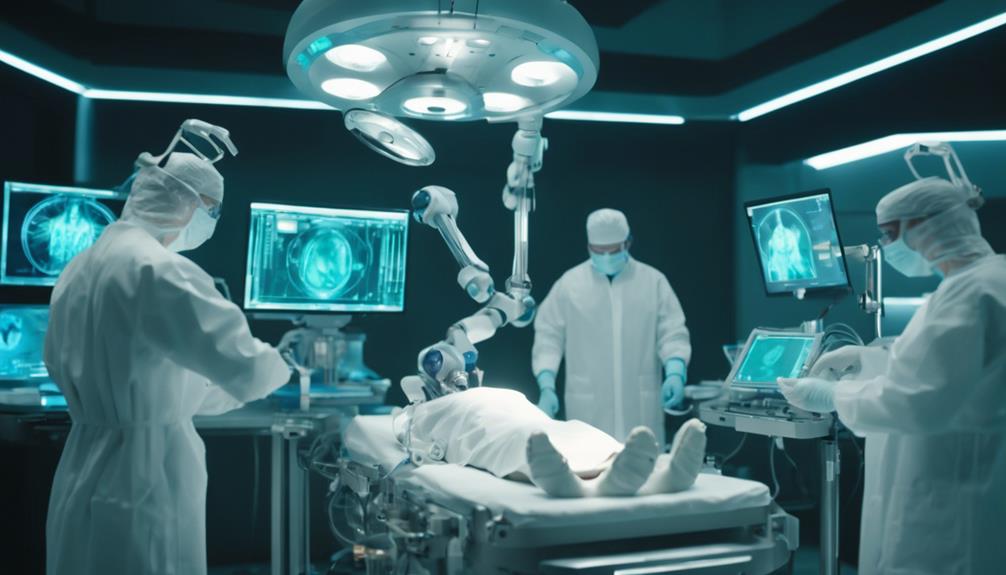AI learning surgical techniques from YouTube videos is fascinating, but it doesn't mean surgeons are obsolete. While AI enhances precision and offers real-time support, it lacks human empathy and complex decision-making skills essential in healthcare. Surgeons blend technical expertise with a deep understanding of patient needs, fostering trust and satisfaction. Robotic surgeries are becoming standard, improving outcomes and recovery times. However, AI's ethical implications and reliance on data quality raise concerns. Rather than replacing surgeons, AI should complement their role, ensuring better patient care. There's much more to uncover about this evolving dynamic in surgery.
Key Takeaways
- AI's ability to learn from video datasets enhances surgical training but does not replace the human empathy and decision-making of surgeons.
- Surgeons remain essential for complex health decisions, fostering patient trust and addressing fears that AI cannot manage.
- Robotic surgery, with AI support, improves precision and recovery but still requires a skilled surgeon to oversee procedures.
- Ethical accountability and public skepticism about AI's role in surgery highlight the need for human oversight in medical practices.
The Role of Surgeons in Healthcare
Surgeons are essential in healthcare, making complex decisions that blend technical skill with a deep understanding of patient needs and values. Your role as a surgeon goes beyond just performing procedures; it involves steering intricate health decisions while integrating patient preferences into treatment plans. This approach fosters trust and satisfaction in the healthcare experience, which robotic surgery alone can't provide.
While robotic and AI-assisted surgeries are transforming procedures, the human element—empathy—remains irreplaceable. You need to connect with patients, addressing their fears and concerns, guaranteeing they feel heard and cared for throughout their surgical journey. Your ability to understand and respond to emotional needs is critical for effective patient care.
Moreover, continuous training is essential for you to stay updated on the latest advancements in robotic surgery. This includes mastering foundational open surgery techniques, which form the basis of laparoscopic and robotic methods. Proctoring and performance evaluations further confirm that you maintain high standards of care.
As you continue to blend technical skills with compassion, your role as a surgeon will remain indispensable in the evolving landscape of healthcare.
AI Advancements in Surgical Techniques

With the human element of empathy still essential in patient care, AI is rapidly advancing surgical techniques, enhancing precision and efficiency in the operating room.
By analyzing countless YouTube videos, AI algorithms have learned intricate surgical methods, allowing for better procedural training. This leap in technology led to the first autonomous laparoscopic surgery in 2022, showcasing AI's potential to perform surgeries without human intervention.
Incorporating AI into surgical workflows greatly improves minimally invasive techniques, which are critical for patient recovery. Real-time support from AI algorithms can map patient-specific needs during procedures, suggesting actions based on extensive data analysis. This level of assistance not only streamlines operations but also enhances decision-making processes.
Moreover, AI's impact extends to cancer detection, where studies reveal a dramatic reduction in pathologist error rates from 3.4% to 0.5%. This improvement in diagnostic accuracy is essential for timely interventions, ultimately leading to better patient outcomes.
As AI continues to evolve, its role in refining surgical techniques will likely transform the field, making surgeries more efficient and precise while still requiring the irreplaceable human touch in patient care.
Benefits of Robotic Surgery

When you consider robotic surgery, you'll notice significant benefits like enhanced precision and accuracy during procedures.
This technology also leads to reduced recovery times, allowing you to get back to your normal life faster.
Plus, the minimally invasive nature of robotic surgery means smaller incisions and less post-operative pain.
Precision and Accuracy
Robotic surgery dramatically enhances precision and accuracy, allowing for improved surgical outcomes that benefit both patients and healthcare providers.
With advanced technology like the da Vinci robot, you'll notice how surgical views can be magnified by 10x, making it easier for surgeons to perform delicate procedures. This enhanced precision is vital, especially in tight anatomical spaces where traditional methods struggle.
The dexterity of robotic systems enables complex maneuvers that minimize invasiveness, which is essential for achieving better patient outcomes. In fact, robotic-assisted surgeries have become standard practice, with 90% of prostate surgeries and over 51% of hysterectomies now performed using these advanced systems. This growing reliance on robotic surgery illustrates the importance of accuracy in modern medicine.
As robotic technology continues to evolve, it's clear that AI-driven innovations are pushing the boundaries of surgical precision. Patients benefit from reduced bleeding, smaller incisions, and overall lower post-operative pain, leading to a smoother recovery process.
The focus on accuracy not only enhances surgical efficiency but also elevates the standard of care, ensuring that both patients and healthcare providers can trust the outcomes of robotic surgeries.
Reduced Recovery Time
Patients often experience markedly reduced recovery times after robotic surgery, allowing them to return to their daily routines much quicker than with traditional methods. With smaller incisions, robotic surgery leads to less postoperative pain, making your recovery much more comfortable. Many patients report feeling notably better within days instead of weeks, which is often the case with conventional surgeries.
Studies show that the average recovery time can be cut down by as much as 50% when opting for robotic-assisted procedures. This impressive reduction is largely due to the precision and dexterity offered by robotic systems, which minimize complications during surgery. When there are fewer complications, your body can heal faster and more efficiently.
Additionally, shorter hospital stays associated with robotic surgery mean you can get back to your normal activities sooner. Imagine being able to resume work or hobbies just days after your procedure instead of waiting for weeks. The benefits of robotic surgery extend beyond just the surgery itself; they encompass a quicker return to your everyday life, enhancing your overall quality of care.
Minimally Invasive Procedures
Minimally invasive procedures offer a revolutionary approach to surgery, allowing for smaller incisions and quicker recoveries that enhance your overall experience.
With robotic surgery, AI can help surgeons achieve greater dexterity and precision in tight spaces, leading to improved minimally invasive outcomes. This advanced technology minimizes bleeding during procedures, which means less pain and quicker healing for you.
Currently, around 90% of prostate surgeries and over half of hysterectomies are performed using robotic systems, highlighting a significant shift in surgical practice. Patients like you benefit immensely from these techniques, as they result in smaller incisions, reduced post-operative pain, and minimal scarring. You'll likely enjoy shorter hospital stays and a faster return to your daily routine.
The da Vinci surgical robot, for instance, offers 10x magnification, enhancing accuracy during surgeries compared to traditional methods. While the initial costs of robotic surgery may be higher, the overall expenses can balance out in efficient programs, making this option increasingly viable for many patients.
Embracing robotic surgery can truly transform your surgical experience and overall recovery.
Challenges and Limitations of AI

As you explore the challenges and limitations of AI in surgery, you'll encounter concerns about data quality and ethical accountability.
Public perception also plays a significant role, as many people might hesitate to trust AI in such a critical field.
Understanding these points is essential for evaluating the future of AI in surgical practice.
Data Quality Concerns
Relying on high-quality, diverse training data is imperative for AI to perform effectively in surgical settings, as biased datasets can lead to flawed predictions and outcomes. If you're considering how AI algorithms are trained, you must understand that data quality plays a significant role in the accuracy of these systems. Poorly curated health and biomedical data can introduce substantial errors, jeopardizing patient safety and surgical efficacy.
Here are some key concerns regarding data quality in AI surgical applications:
- Bias in Data: Algorithms trained on narrow populations may not apply to broader demographics.
- Limited Data Sources: Relying on a few datasets can restrict the AI's ability to generalize across various surgical contexts.
- Privacy Issues: While federated learning helps maintain patient confidentiality, it can complicate data accessibility.
Ethical Accountability Issues
Steering through the ethical accountability issues surrounding AI in surgery means grappling with questions of responsibility for patient outcomes, which could involve software developers, hospitals, and physicians.
The reliance on AI algorithms as support tools requires you, as a clinician, to retain ultimate decision-making authority. This necessity emphasizes your need to understand AI's capabilities and limitations deeply.
Moreover, the quality of AI algorithms depends heavily on the data used for training. Poor data can lead to biased and inaccurate results, raising significant ethical accountability concerns. You must advocate for diverse data sources to guarantee the ethical application of AI in healthcare.
Compounding these challenges is the lagging regulatory framework. With almost 400 AI algorithms cleared by the FDA but most lacking full approval, the adaptability and accountability of these systems become even more complex.
Public skepticism also plays a vital role, with around 60% of Americans expressing unease regarding AI's involvement in personal healthcare. This skepticism could impede the widespread adoption of AI in surgical practices, making it essential to address these ethical accountability issues thoroughly.
Public Perception Challenges
Steering public perception challenges around AI in surgery requires addressing deep-seated fears and misconceptions that can hinder acceptance and integration of these technologies. Many people worry about the role of AI models in health care, particularly when it comes to surgical procedures.
To effectively tackle these challenges, consider the following points:
- Skepticism: 60% of Americans feel uneasy about AI reliance in personal healthcare.
- Ethical concerns: There's confusion over who holds accountability for AI-driven medical decisions.
- Resistance to change: Surgeons must view AI as a collaborative tool, not a competitor.
These factors contribute to a negative public perception surrounding AI in surgery. Media coverage of AI-related errors often amplifies these fears, making it essential to communicate the benefits and risks effectively.
Ethical Considerations in AI Surgery

The ethical landscape of AI in surgery raises significant questions about accountability, informed consent, and the protection of patient data.
As you consider the role of AI in surgical procedures, it's important to understand who's responsible for decisions made by these systems. Is it the software developers, the healthcare institutions, or the surgeons using the technology? This ambiguity complicates accountability, making it essential to establish clear guidelines.
Informed consent is another key issue. Patients need to be fully aware of AI's role in their care and the potential risks that come with it. Without proper communication, informed consent can't truly be achieved. Additionally, the integration of AI must adhere to rigorous ethical standards to prevent biases in decision-making, ensuring equitable access to surgical care for all patients.
You should also be aware of data privacy concerns, as patient data is often used to train AI algorithms. Protecting individual confidentiality and autonomy is critical in this situation.
As AI continues to evolve in surgery, addressing these ethical considerations becomes increasingly important for maintaining trust and safety in healthcare.
Patient Perspectives on Robotic Surgery

Considering the rising popularity of robotic surgery, many patients now find themselves more at ease with the idea of advanced technology playing a role in their surgical procedures.
With the reassurance that human surgeons control the robotic systems, patients can trust that their safety is paramount. Over time, fears surrounding robotic surgery have decreased, reflecting a growing acceptance and confidence in its benefits.
Here are some key points patients often consider:
- Precision: Robotic systems offer a 3D view of the surgical field, enhancing the accuracy of procedures.
- Control: Surgeons maintain oversight, ensuring a human touch in every operation.
- Popularity: With 90% of prostate surgeries and 51% of hysterectomies performed robotically, many patients see this as a norm.
Ultimately, as trust in robotic surgery grows, patients are increasingly open to embracing this innovative technology, recognizing its potential to improve outcomes and enhance their surgical experiences.
Future Trends in Surgical Innovation

Rapid advancements in AI are transforming surgical innovation, promising to enhance both precision and efficiency in operating rooms. As you look toward the future, it's vital to recognize the role AI will play in surgery. With technologies like robotic systems learning from extensive surgical videos, we can expect major shifts in patient outcomes.
| Trend | Impact on Surgery | Importance for Patients |
|---|---|---|
| AI-assisted techniques | Greater precision in procedures | Reduced recovery times |
| Autonomous surgeries | Increased efficiency | Lower risk of complications |
| Real-time data analysis | Enhanced decision-making | Improved overall outcomes |
| Collaboration with surgeons | Maintained human oversight | Trust in surgical care |
| Minimally invasive procedures | Less trauma to patients | Faster return to normal life |
Future trends indicate that AI will serve as an assistant technology, working alongside human surgeons. This collaboration will not only optimize surgical workflows but also guarantee that the art of medicine remains central to surgical practice. As technology evolves, your understanding of its integration into surgery will be significant in appreciating its impact on healthcare.
Balancing Technology and Human Touch

As AI continues to enhance surgical precision, maintaining the human touch in patient care is crucial for fostering trust and improving recovery outcomes.
While technology can assist in surgery, it can never replicate the compassion and empathy that human practitioners provide. These qualities are irreplaceable; they create strong bonds between patients and providers, which is essential for effective medical care.
To strike a balance between technology and the human touch, consider these points:
- Personal Connections: Establishing rapport can greatly enhance patient satisfaction.
- Emotional Support: Offering compassion helps ease patient anxiety before and after surgery.
- Complex Decision-Making: You provide insights that AI simply can't match in personal circumstances.
Incorporating AI into surgery should complement, not replace, the art of medicine.
By blending advanced technologies with a compassionate approach, you can guarantee that patient care remains holistic, emphasizing both precision and the crucial human connection.
This balance will ultimately lead to better outcomes and a more satisfying healthcare experience for everyone involved.
Frequently Asked Questions
Will Surgeons Get Replaced by Ai?
You shouldn't worry about AI replacing surgeons anytime soon. While AI can assist in some tasks, it lacks the critical decision-making skills and emotional intelligence necessary for complex surgeries that only trained human surgeons possess.
Will Surgeons Become Obsolete?
You shouldn't worry about surgeons becoming obsolete. Their unique skills in compassion, decision-making, and adaptability in patient care guarantee they remain essential. AI will support, not replace, the invaluable human touch in medicine.
Can AI Perform a Surgical Operation?
Imagine a dancer flawlessly following a routine—AI can mimic surgical techniques, but it can't truly lead. While AI can assist in operations, the delicate art of surgery still requires human hands and intuition.
Does Youtube Allow Surgery Videos?
Yes, YouTube allows surgery videos, but you need to be cautious. Some content might not meet community guidelines, so always check the credibility of the source and verify the information is accurate before relying on it.
Will AI learning from nontraditional methods make human professionals obsolete in the future?
As “ai learns to trade stocks,” there is concern about the future of human professionals. While AI is advancing in nontraditional learning methods, it is unlikely to make human professionals obsolete. Instead, it will likely complement and enhance their work, offering new opportunities for collaboration and productivity.
Conclusion
As the scalpel of innovation slices through the traditional fabric of surgery, you can't help but wonder about the threads that hold it all together.
While AI and robotic systems promise precision and efficiency, the human touch remains the golden needle, stitching compassion and understanding into the healing process.
Embracing technology doesn't mean discarding our skilled surgeons; instead, it symbolizes a partnership where both can thrive, ensuring that care remains both advanced and heartfelt.









